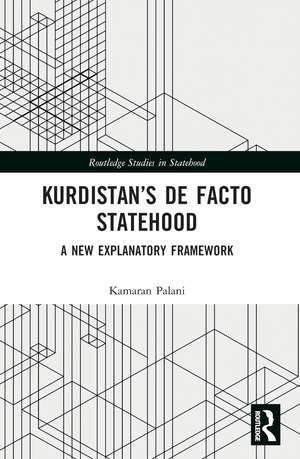Kurdistan’s De Facto Statehood: A New Explanatory Framework: Routledge Studies in Statehood
Autor Kamaran Palanien Limba Engleză Paperback – 27 mai 2024
The work examines de facto statehood in Kurdistan, and uncovers the dynamics of de facto statehood in Kurdistan at internal, national and international levels. Kurdistan’s de facto statehood is shown to be inherently characterised by fluidity. In this book, fluidity is defined as a highly unstable feature of de facto statehood in the relational context of non-recognition. The book includes interviews with a number of high-profile politicians and policy makers from the region. These provide unique insights into such issues as the four main factors at play in the fluidity of the de facto state of Kurdistan: the balance of power between Erbil and Baghdad; the level and form of internal fragmentation; the change of strategies to gain international recognition; and the uncertain and fluctuating external support.
This book will be of much interest to students of statehood studies, Middle Eastern politics, and International Relations.
| Toate formatele și edițiile | Preț | Express |
|---|---|---|
| Paperback (1) | 389.66 lei 6-8 săpt. | |
| Taylor & Francis – 27 mai 2024 | 389.66 lei 6-8 săpt. | |
| Hardback (1) | 998.83 lei 6-8 săpt. | |
| Taylor & Francis – 9 sep 2022 | 998.83 lei 6-8 săpt. |
Preț: 389.66 lei
Nou
Puncte Express: 584
Preț estimativ în valută:
74.57€ • 77.57$ • 61.56£
74.57€ • 77.57$ • 61.56£
Carte tipărită la comandă
Livrare economică 15-29 aprilie
Preluare comenzi: 021 569.72.76
Specificații
ISBN-13: 9781032269665
ISBN-10: 1032269669
Pagini: 136
Dimensiuni: 156 x 234 mm
Greutate: 0.45 kg
Ediția:1
Editura: Taylor & Francis
Colecția Routledge
Seria Routledge Studies in Statehood
Locul publicării:Oxford, United Kingdom
ISBN-10: 1032269669
Pagini: 136
Dimensiuni: 156 x 234 mm
Greutate: 0.45 kg
Ediția:1
Editura: Taylor & Francis
Colecția Routledge
Seria Routledge Studies in Statehood
Locul publicării:Oxford, United Kingdom
Public țintă
Postgraduate, Professional, and Undergraduate AdvancedCuprins
1. Introduction 2. On de Facto Statehood 3. Background to Kurdistan's de Facto Statehood 4. A Volatile Partnership 5. Changing Strategies to Gain International Recognition 6. Who is a Patron? Who is a Client? 7. Conclusions and Implications
Notă biografică
Kamaran Palani is a Lecturer in International Relations at Salahaddin University-Erbil.
Recenzii
'This is a unique, perceptive, scholarly voice analyzing the dynamics of Iraqi Kurdistan’s often fragmented, fluid existence and de facto sovereignty. As such, this book is a welcomed, well-written addition to the burgeoning literature in Kurdish studies.'
Michael M. Gunter, Professor of Political Science, Tennessee Technological University, and secretary-general of the EU Turkey Civic Commission (EUTCC)
'I highly recommend Kamaran Palani's book "Iraqi Kurdistan's de facto statehood". It is an important contribution to the growing number of studies on the Kurds in general and the Kurdistan Region in Iraq in particular. In addition to his intimate knowledge of the subject, Palani provides a new theoretical framework for understanding the unique case of the de facto state that has emerged in Iraqi Kurdistan. His thesis of the fluid entity goes a long way to explain the complexity of this entity and the ebbs and flows in the thirty years of its existence.'
Professor Ofra Bengio, Senior Research Fellow at the Moshe Dayan Center for Middle Eastern and African Studies, Tel Aviv University and Head of Kurdish Studies Program at the Moshe Dayan Center.
'Kamaran Palani uses the case of Iraqi Kurdistan to offer readers a nuanced and original analysis of de facto states. He convincingly explains why "Statehood within these entities is a matter of degree, and hence de facto states should be studied as dynamic and fluid political entities." This book should prove invaluable for those wanting to understand how Iraqi Kurdistan remains both a de facto state and also a federal region of Iraq, why the Kurds in this region pursue their own diplomacy and foreign relations yet still remain dependent on Baghdad, or how and why the 2017 referendum on independence constituted both a success and a bitter defeat for the Kurds -- among other things.'
David Romano, Thomas G. Strong Professor of Middle East Politics, Missouri State University
Michael M. Gunter, Professor of Political Science, Tennessee Technological University, and secretary-general of the EU Turkey Civic Commission (EUTCC)
'I highly recommend Kamaran Palani's book "Iraqi Kurdistan's de facto statehood". It is an important contribution to the growing number of studies on the Kurds in general and the Kurdistan Region in Iraq in particular. In addition to his intimate knowledge of the subject, Palani provides a new theoretical framework for understanding the unique case of the de facto state that has emerged in Iraqi Kurdistan. His thesis of the fluid entity goes a long way to explain the complexity of this entity and the ebbs and flows in the thirty years of its existence.'
Professor Ofra Bengio, Senior Research Fellow at the Moshe Dayan Center for Middle Eastern and African Studies, Tel Aviv University and Head of Kurdish Studies Program at the Moshe Dayan Center.
'Kamaran Palani uses the case of Iraqi Kurdistan to offer readers a nuanced and original analysis of de facto states. He convincingly explains why "Statehood within these entities is a matter of degree, and hence de facto states should be studied as dynamic and fluid political entities." This book should prove invaluable for those wanting to understand how Iraqi Kurdistan remains both a de facto state and also a federal region of Iraq, why the Kurds in this region pursue their own diplomacy and foreign relations yet still remain dependent on Baghdad, or how and why the 2017 referendum on independence constituted both a success and a bitter defeat for the Kurds -- among other things.'
David Romano, Thomas G. Strong Professor of Middle East Politics, Missouri State University
Descriere
This book explains the dynamics and nature of Iraqi Kurdistan’s de facto statehood since its inception in 1991, in particular the vicissitudes de facto independence since then.







